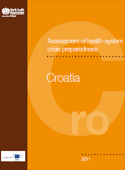Assessment of health-system crisis preparedness: Croatia

Download
In 2008, with the support of the European Commission Directorate-General for Health and Consumers, WHO launched the project, “Support to health security, preparedness planning and crises management in European Union, EU accession and neighbouring (ENP) countries”, with the aim of improving preparedness for public health emergencies in countries of the WHO European Region. One of the objectives of the project was to test the tool being developed for use in assessing the capacity of health systems for managing crises. The tool, which is based on the WHO health-system framework, was piloted in planning and crises-management assessments carried out in 2007−2008 in Armenia, Azerbaijan and the Republic of Moldova under the joint EC–WHO project, “Support to health security and preparedness planning in EU neighbouring countries”. The experience gained in these countries and during a second round of assessments carried out in Kazakhstan, Poland and Ukraine in 2009−2010 contributed to the finalization of the tool. In October 2010 and July 2011, assessments were carried out in Turkey and Croatia respectively. This report presents an evaluation of the level of preparedness of the Croatian health system to deal with crises, regardless of cause. It also examines the risk-prevention and risk-mitigation initiatives of the country. While the main focus is on the national level, some attention has been paid to intercountry cooperation on crisis-management capacity and to the links between the various levels of government.



